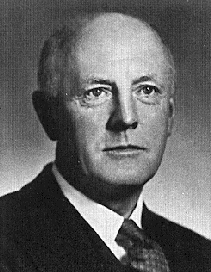
Frank Hawkins Underhill was born in Stouffville, Ontario, in 1889. He completed degrees at the University of Toronto and Oxford University. After serving in the Great War, he returned to a teaching position at the University of Saskatchewan. In 1927, he began teaching at his alma mater, but his 27-year tenure at Toronto was far from tranquil.
An inspiring teacher, Underhill was one of this country’s earliest intellectual historians. He was also a strident social critic, and many of his writings were devoted to political commentary in the pages of the Canadian Forum and other periodicals.
Throughout his career, Underhill’s socialist politics raised the ire of both politicians and administrators. As co-founder of the League for Social Reconstruction and one of the architects of the Regina Manifesto, he often found himself fending off charges of “anti-British” behaviour. His perseverance in his political activities led to what was widely regarded as a victory for the preservation of academic freedom in Canadian universities.
In 1955, Underhill arrived in Ottawa as the curator of Laurier House. He soon became involved with Carleton, serving in its Senate and as a professor of political science. Underhill willed his personal library to Carleton, and upon his death in 1971, the Underhill Reading Room was established within the Department of History. In co-operation with Dr. Blair Neatby, an endowment was inaugurated in memory of Dr. Underhill (the Underhill Reading Room Fund) for the purchase of new books for the Reading Room and for the support of special projects, including this annual graduate student colloquium.
F. H. Underhill
Frank Hawkins Underhill est né à Stouffville (Ontario) en 1889. Il obtient ses diplômes de l’Université de Toronto et de l’Université d’Oxford. Après avoir servi durant la Grande Guerre, il reprend son poste d’enseignant à l’Université de la Saskatchewan. En 1927, il commence à enseigner à son alma mater, mais son mandat, qui durera 27 ans, à l’Université de Toronto est loin d’être paisible.
Underhill, un enseignant inspirant, devient l’un des premiers historiens intellectuels du pays. Il est également un critique social véhément et nombreux de ses écrits sont des commentaires politiques publiés dans le magazine Canadian Forum et d’autres revues.
Tout au long de sa carrière, la politique socialiste d’Underhill suscite l’exaspération tout autant des politiciens que des administrateurs. En tant que cofondateur de la Ligue pour la reconstruction sociale et l’un des architectes du manifeste de Regina, il se voit souvent devoir se défendre contre les accusations d’avoir un comportement « anti-britannique ». La persévérance de ses activités politiques est à l’origine de ce qui est souvent considéré comme étant une victoire pour la préservation de la liberté académique dans les universités canadiennes.
En 1955, Underhill arrive à Ottawa pour assumer le poste de conservateur de la maison Laurier. Il ne tarde pas à établir des liens avec l’Université Carleton, servant dans son sénat et à titre de professeur de sciences politiques. Underhill a légué sa bibliothèque personnelle à l’Université Carleton et, à son décès en 1971, la salle de lecture Underhill est établie au Département d’histoire de l’Université. Avec la coopération du Dr Blair Neatby, un fonds de dotation (Underhill Reading Room Fund) est inauguré à la mémoire de Dr Underhill, destiné à l’achat de nouveaux ouvrages pour la salle de lecture et au soutien de projets spéciaux, dont ce colloque annuel pour étudiants des cycles supérieurs.